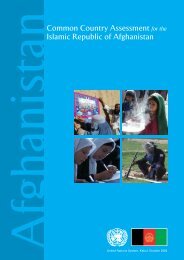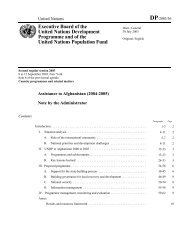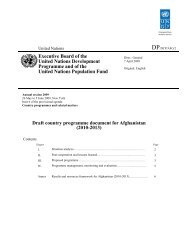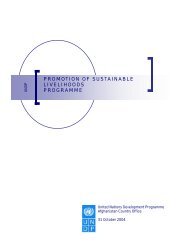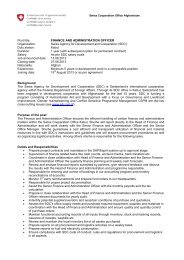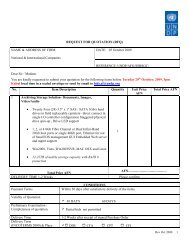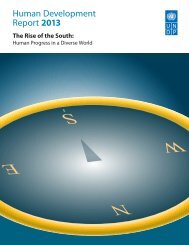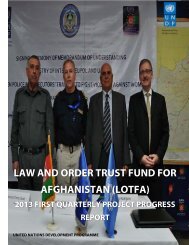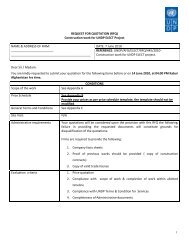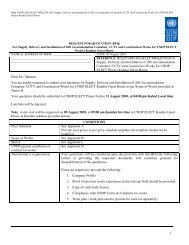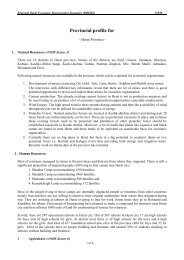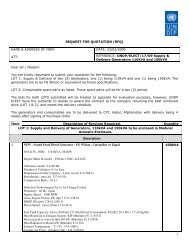Conference Report Annexes 10-12 May, 2004 - UNDP Afghanistan
Conference Report Annexes 10-12 May, 2004 - UNDP Afghanistan
Conference Report Annexes 10-12 May, 2004 - UNDP Afghanistan
Create successful ePaper yourself
Turn your PDF publications into a flip-book with our unique Google optimized e-Paper software.
P. 71<br />
<strong>Annexes</strong>
List of Official Delegations<br />
United Nations Development Programme (<strong>UNDP</strong>)<br />
Headquarters delegation<br />
Mr. Mark Malloch Brown, <strong>UNDP</strong> Administrator<br />
Mr. Kalman Mizsei, Assistant Secretary General Regional Director Regional Bureau for<br />
Europe and CTS<br />
Mr. David Lockwood, Deputy Regional Director Regional Bureau for Asia Pacific<br />
Ms. Gulden Turkoz-Cosslett, RBEC Cluster-1, Senior Programme Manager<br />
Ms. Shoko Noda, Personal Assistant to Administrator<br />
AFGHANISTAN<br />
Government Delegation<br />
H.E. Ashraf Ghani, Minister of Finance, Ministry of Finance<br />
Mr. Mohammad Dindar, Chief of Staff, Ministry of Finance<br />
Mr. Besmullah Kamawi, Head of General Customs, Ministry of Finance<br />
Mr. Mohd Baqar, Special Assistant to the Minister, Ministry of Finance<br />
Mr. Sayed Mustafa Kazemi, Minister of Commerce, Ministry of Commerce<br />
Mr. Ghaus Mohammad Bahir, Director of Trade Department, Ministry of Commerce<br />
Mr. Said Shafic Gawhari, Adviser to the Minister, Ministry of Commerce<br />
Mr. Reinhard Palm, Adviser to the Minister, Ministry of Commerce<br />
Mr. Noorullah Delewari, Chief Executive Officer, Afghan Investment Support Agency<br />
(AISA), Ministry of Commerce<br />
Dr. Ghulam Jelani Jelis, Deputy Minister, Ministry of Power and Water<br />
Mr. Mohammad Hashim Payman, Head of Planning, Ministry of Communications<br />
Private-Sector Delegation<br />
Mr. Gholam Daud Nassib, Nassib Edible Oil Company<br />
Mr. Mohamad Rafiq Ahmadyar, Director, TNT <strong>Afghanistan</strong><br />
Mr. Haji Hafizullah, Habib Hafiz Ltd.<br />
Mr. Hamid Qaderi, Qaderi Transport Ltd.<br />
Mr. Amin Karimzad, CEO / Director, Aman Karimzada Ltd./ Kabul Chambers of Commerce<br />
72
Mr. Kabir Arghandiwal, Scimitar Global Ventures, UAE<br />
Mr. Kamaluddin Gulam Nabi, Kamal Nabizada Co. Inc<br />
Mr. Habibullah Gulzar, Habib Gulzar International LLC., UAE<br />
Mr. Zaher Yaqubie, ARC Companies<br />
Mr. Gulyam Sakhi, Private Sector<br />
<strong>UNDP</strong> Delegation<br />
Mr. Ercan Murat, Country Director, <strong>UNDP</strong> <strong>Afghanistan</strong><br />
Ms. Cherie Hart, Regional Communications Officer, <strong>UNDP</strong> Thailand<br />
Mr. Hugh Riddell, Consultant, <strong>UNDP</strong> <strong>Afghanistan</strong><br />
Ms. Paula Newberg, Consultant, <strong>UNDP</strong> <strong>Afghanistan</strong><br />
IRAN<br />
Government Delegation<br />
Mr. Mohammad Shariatmadari, Minister of Commerce, Ministry of Commerce<br />
Mr. Khazaei, Deputy Minister of Economy and Finance, Ministry of Finance<br />
Mr. Mashaherefard, Deputy Head of Main Directorate of International, Ministry of<br />
Economy<br />
Mr. Bigdeli, Chairman of <strong>Afghanistan</strong>'s Headquarters<br />
Mr. Kohzadi, Chairman of Export Guarantee Fund of Iran<br />
Mr. Seif, Chairman of National Bank of Iran, National Bank of Iran<br />
Mr. Asadian, General Director of Ministry of Commerce, Ministry of Commerce<br />
Mr. Saedi, General Director and Head of Administration of Minister of Commerce,<br />
Ministry of Commerce<br />
Mr. Zaafarani, Deputy of National Bank, National Bank<br />
Mr. Naraghi, Representative of Protocol Department<br />
KAZAKHSTAN<br />
Government Delegation<br />
Ms. Zhanar Aitzhanova, Vice Minister, Ministry of Industry and Trade<br />
Mr. Rustem Khamzin, Director, Dept of Intl Economic &Financial Relations, Ministry of<br />
Economy, Ministry of Economy and Budget Planning<br />
Mr. Rustem Zhumataev, Head of Division, Ministry of Transport<br />
Mr. Erzhan Mukash, Director of Department, Ministry of Foreign Affairs<br />
73 <strong>Annexes</strong>
Mr. Miraz Kasymov, Head of division, Ministry of Industry and Trade<br />
Private-Sector Delegation<br />
Mr. Viktor Yambaev, President, Almaty Association of Entrepreneurs<br />
Mr. Munavara Paltasheva, Director, Almaty Association of Entrepreneurs<br />
Mr. Maral Tompiev, President, Universal complex “Medina”, Almaty<br />
Mr. Serik Turjanov, Director, Department of Small Business, Almaty<br />
Mr. Din Kim, Director of Almaty branch, JSC “AgromashHolding”<br />
Mr. Bekzan Beishembekov, Marketing Manager, JSC “AgromashHolding”<br />
<strong>UNDP</strong> Delegation<br />
Mr. Fikret Akcura, Resident Representative, <strong>UNDP</strong><br />
KYRGYZSTAN<br />
Government Delegation<br />
H.E. Askar Akaev, President of the Kyrgyz Republic<br />
Mr. Imil Akkoziev, Advisor to President<br />
Mr. Nikolay Tanaev, Prime Minister<br />
Mr. Melis Satybekov, Deputy Head of Prime Minister Apparatus, Prime Minister<br />
Apparatus<br />
Ms. Cholpon Ibraimova, Head of Department of International Cooperation, Prime<br />
Minister Apparatus<br />
Mr. Djamalbek Turgunbekov, Adviser of International Cooperation Department, Prime<br />
Minister Apparatus<br />
Mr. Kubanychbek Jumaliev, Minister, Ministry of Transport and Communications<br />
Mr. Alikbek Djekshenkulov, Deputy of the Head of President Administration, President<br />
Administration<br />
Mr. Joomart Otorbaev, Vice Prime Minister<br />
Mr. Edward Edgaro, Advisor of Vice-Prime Minister, Secretariat of Vice Prime Minister<br />
Mr. Askar Aitmatov, Minister, Ministry of Foreign Affairs<br />
Mr. Talantbek Kushchubekov, First Deputy Minister, Ministry of Foreign Affairs<br />
Mr. Mamkulov Erkin, Deputy Minister, Ministry of Foreign Affairs<br />
Mr. Amangeldy Muraliev, Acting Minister, Ministry of Economic Development, Industry<br />
and Trade<br />
Ms. Nina Kirichenko, Deputy Minister of Economic Development, Trade and Industry,<br />
Ministry of Economic Development, Trade and Industry<br />
Mr. Murat Ismailov, Deputy Finance Minister, Ministry of Finance<br />
74
Mr. Mukhtar Djumaliev , First Deputy Minister, Ministry of Economic Development,<br />
Industry and Trade<br />
Mr. Aizat Ajikeev, Deputy Minister, Ministry of Transport and Communications<br />
Mr. Anvar Tursunov, Chairman, State Committee on Architecture and Construction<br />
Mr. Akylbek Tyumenbaev, Deputy Director, State Agency on Energy under the<br />
Government<br />
Ms. Chinara Ibraimova, Ministry of Finance<br />
Mr. Asylbek Aidaraliev, Advisor to the President, Chairman of the National Center of<br />
Development of Mountain Regions of the KR<br />
Mr. Temursho Akbarov, Advisor, Trade Representative of Kyrgyz Republic in<br />
<strong>Afghanistan</strong><br />
Private-Sector Delegation<br />
Mr. Boris Perfiliev, President, Chamber of Commerce and Industry<br />
Mr. Jyrgalbek Surabaldiev, President, The Union of Entrepreneurs “New Step”<br />
Mr. Emil Umetaliev, Chairman, Business Association<br />
Mr. Kubanychbek Kasymaliev, President, Association of Exporters<br />
Mr. Iliya Bessmertny, General Director, JSC “Kant Cement-Slate Factory”<br />
Mr. Nurdin Abdyldaev, General Director, “Interglass” Ltd<br />
Mr. Sergey Slepchenko, Director, Bishkek Chamber for Trade Promotion<br />
Mr. Eduard Rausch, General Manager, REEMTSMA Kyrgyzstan<br />
<strong>UNDP</strong> Delegation<br />
Mr. Jerzy Skuratowicz, Resident Representative, <strong>UNDP</strong><br />
Mr. David Akopyan, Deputy Resident Representative, <strong>UNDP</strong><br />
Mr. Wojciech Hübner, Economic Reforms Advisor in Central Asia, <strong>UNDP</strong><br />
Mr. Leonid Komarover, Senior Policy Adviser, <strong>UNDP</strong><br />
Ms. Gulnara Abdyldaeva, Operations Manager, <strong>UNDP</strong><br />
Mr. Arkady Divinsky, UN Coordination Associate, <strong>UNDP</strong><br />
Mr. Edem Bakhshish, Assistant Resident Representative, <strong>UNDP</strong><br />
Ms. Olga Grebennikova, Public Relations Officer, <strong>UNDP</strong><br />
Ms. Aikan Mukanbetova, Programme Officer, <strong>UNDP</strong><br />
Ms. Nazik Umuralieva, Administrative Assistant, <strong>UNDP</strong><br />
Ms. Mia Rimby, Programme Officer, Governance Unit, <strong>UNDP</strong><br />
Mr. Rahim Ismailov, Assistant to Economic Reforms Advisor, <strong>UNDP</strong><br />
Ms. Ludmila Kim, Executive Secretary of the <strong>Conference</strong>, <strong>UNDP</strong><br />
Ms. Medina Kalygulova, Reception, <strong>UNDP</strong><br />
Mr. Alain Scolan, Head, BOMCA/CADAP<br />
75 <strong>Annexes</strong>
Mr. Paul Grassi, Deputy Head, BOMCA/CADAP<br />
Mr. Talaibek Usubaliev, Country Manager in Kyrgyzstan, BOMCA/CADAP<br />
Mr. Djangarachev Chingiz, Deputy Country Manager in Kyrgyzstan, BOMCA/CADAP<br />
Ms. Mira Djangaracheva, NCSA<br />
Mr. Mircea-Iulius Onita, Expert, Investment Round Table Secretariat<br />
PAKISTAN<br />
Government Delegation<br />
H.E.. Tariq Ikram, Minister, of State and Chairman of the Export Promotion Bureau<br />
Mr. Zia ul Haq, Additional Secretary, Economic Affairs Division<br />
Mr. Zafar Qadir, Joint Secretary, Ministry of Commerce<br />
Dr. Hammad Uwais Agha, Deputy Secretary, Economic Affairs Division<br />
Mr. Ahmad Farooq, Deputy Secretary, Ministry of Commerce<br />
Mr. Khurshid Ali Chauhan, Assistant Chief (ECO), Economic Affairs Division<br />
Mr. Liaquat Ally Agha, Collector of Customs, Customs House, Peshawar<br />
Mr. Fida Muhammad, Deputy Secretary, Ministry of Communications<br />
Mr. Muhammad Naeem, Managing Director, Modern Pipe Mills Ltd, Lahore<br />
Mr. Muhammad Tariq Iqbal Mughal, Director, Mughal Steel<br />
Private-Sector Delegation<br />
Mr. Bashir Ahmad, General Manager, National Engineering Services, Pakistan Ltd.<br />
Mr. Kalim Ahmed Mobin, General Manager Marketing, Lucky Cement Ltd<br />
Mr. Jawaid Altaf Shaikh, Export Manager, Geofman Pharmaceuticals<br />
<strong>UNDP</strong> Delegation<br />
Mr. Önder Yücer, Resident Representative, <strong>UNDP</strong><br />
TAJIKISTAN<br />
Government Delegation<br />
Mr. Saidullo Rakhimov, Deputy Minister of Transport, Ministry of Transport<br />
Mr. Isroil Mahmudov, Deputy Minister of Economy and Trade, Ministry of Economy and<br />
Trade<br />
Mr. Alexei Silantev, First Deputy Minister of Energy, Ministry of Energy<br />
Private-Sector Delegation<br />
76
Mr. Sharif Saidov, Chairman, Chamber of Commerce<br />
Mr. Komil Kholikov, Commercial Director, OJSC “Avicenna”<br />
<strong>UNDP</strong> Delegation<br />
Ms. Mia Seppo, Deputy Resident Representative, <strong>UNDP</strong><br />
Arto Immonen, Programme Officer, <strong>UNDP</strong><br />
Ms. Anna Matveeva, Regional Adviser on Peace and Development in Central Asia, <strong>UNDP</strong><br />
TURKMENISTAN<br />
Government Delegation<br />
Mr. Chary Niyazov, First Deputy Minister, Ministry of Foreign Affairs<br />
Mr. Akmurad Mamedov, Chief of Budget Department and Financing, Ministry of Finance<br />
<strong>UNDP</strong> Delegation<br />
Mr. Khaled Philby, Resident Representative, <strong>UNDP</strong><br />
UZBEKISTAN<br />
Government Delegation<br />
Mr. Alisher Salahitdinov, Ambassador of the Republic of Uzbekistan in Kyrgyz Republic<br />
Mr. Parviz Aliev, Head of Department, Ministry of Foreign Affairs<br />
Mr. Abdujalil Abdujabarov, Head of Department of the Transport Maintenance, Agency of<br />
External Economic Relations<br />
Private-Sector Delegation<br />
Mr. Samariddin Ibragimov, Chairperson of Management, “Sharq Plast Service”<br />
Mr. Alisher Niyazmatov, Head, Bresona Investments LLC<br />
Mr. Vyacheslav Sohibnazarov, Commercial Director, Avialeasing Aviation Company<br />
Mr. Vadim Berdyanskiy, Manager, “Agrotech” Inc. (USA)<br />
Mr. Djamshid Razakov, Director, “Maroqand” Company<br />
<strong>UNDP</strong> Delegation<br />
Mr. Erick de Mul, Resident Representative, <strong>UNDP</strong><br />
Mr. Bakhodur Eshonov, Programme Analyst, <strong>UNDP</strong><br />
77 <strong>Annexes</strong>
WORLD BANK (WB) delegation<br />
Mr. Alastair McKechnie, Country Director for <strong>Afghanistan</strong>, The World Bank Group<br />
Mr. Chris Lovelace, Country Manager, Kyrgyz Republic<br />
Mr. Simon Kenny, Regional Coordinator, Central Asia<br />
Mr. Aslan Sarinzhipov, Operations Officer, WB Central Asia Regional Office,<br />
Kazakhstan<br />
Mr. Serdar Jepbarov, Operations Officer, WB Country Office, Turkmenistan<br />
ASIAN DEVELOPMENT BANK (ADB) delegation<br />
Dr. Frank Polman, Senior Advisor, South Asia Department and Special Representative to<br />
<strong>Afghanistan</strong>, ADB, Philippines<br />
Mr. Rajiv Kumar, Principal Economist, ADB, Philippines<br />
Mr. Hideaki Iwasaki, Project Specialist, South Asia Transport and Communications<br />
Division Asian Development Bank, ADB, Philippines<br />
ECO delegation<br />
Mr. Askhat Orazbay, Secretary General, ECO Iran<br />
Mr. Isik Orhan, Deputy Secretary General (Trade and Investment), ECO Iran<br />
78
Summaries of Discussions<br />
Working Group I - <strong>10</strong> <strong>May</strong> <strong>2004</strong><br />
<strong>Afghanistan</strong>: a new regional player<br />
Rapporteur: Mr. Talantbek Kushchubekov<br />
Deputy Minister of Foreign Affairs, Kyrgyz Republic<br />
The Working Group met to discuss<br />
<strong>Afghanistan</strong>'s role as a bridge between<br />
Central and South Asia; incentives for<br />
regional trade and investment in<br />
<strong>Afghanistan</strong>'s reconstruction and<br />
recovery; and prospects for regional<br />
cooperation on a wide range of issues<br />
critical to the future growth of the entire<br />
region. The working group was chaired<br />
by the Chief Executive Officer of the<br />
Afghan Investment Support Agency, and<br />
was facilitated by a <strong>UNDP</strong> senior<br />
consultant.<br />
The Working Group noted that<br />
<strong>Afghanistan</strong> has taken enormous strides in<br />
its reconstruction and recovery during the<br />
past two years. Nonetheless, it took its<br />
guidance from the Afghan delegation,<br />
which suggested that the future for both<br />
<strong>Afghanistan</strong> in particular as well as the<br />
region as a whole lies in the “big picture”.<br />
The Working Group therefore discussed a<br />
number of broadly gauged subjects to<br />
provide a context for the specific<br />
recommendations listed below. In<br />
particular, it considered: trade, transit and<br />
travel; security and regional trade;<br />
regional investment and communications;<br />
national economic reform; social and<br />
economic progress; entrepreneurship;<br />
border relationships; migration and<br />
labour; training and capacity building;<br />
information sharing across borders;<br />
parallel economies and narcotics;<br />
transparency and anti-corruption policies;<br />
the importance of civil society<br />
participation; enhancing the role of<br />
women in reconstruction and recovery; the<br />
role of regional organizations in<br />
promoting regional prosperity; and more<br />
generally, the evolving concept of regional<br />
relations across the previous divides of<br />
South, Central and West Asia. Delegates<br />
paid particular attention to the<br />
intersections among these policy arenas.<br />
On the basis of these discussions, the<br />
Working Group proposes to the region's<br />
governments and participating multilateral<br />
institutions the following initiatives:<br />
79 <strong>Annexes</strong>
Foster regional cooperation on poverty<br />
reduction, urgent social programs, good<br />
governance and post-conflict recovery:<br />
the Working Group underscored the need<br />
to create regional capacity for comparative<br />
analysis of social policy, with particular<br />
attention to economic and social<br />
vulnerability, family planning and<br />
integrating poverty indicators into<br />
regional economic planning. Capacitybuilding<br />
areas include statistical analysis,<br />
policy benchmarks, human development<br />
indices, and sponsored research on behalf<br />
of international institutions.<br />
Develop regional institutions and<br />
strengthen existing cross-border<br />
organizations in order to accelerate<br />
regional economic cooperation: the<br />
Working Group noted the existence of<br />
effective regional organizations, including<br />
new institutions created under the auspices<br />
of the international community, but<br />
emphasized nonetheless the need to<br />
encourage regional engagement in<br />
<strong>Afghanistan</strong>'s social and economic<br />
recovery by harmonizing national<br />
regulations that can promote investment in<br />
<strong>Afghanistan</strong>.<br />
Such initiatives include strengthening<br />
standard-setting activities of the Economic<br />
Cooperation Organization; supporting<br />
<strong>Afghanistan</strong>'s membership in the World<br />
Trade Organization; expanding<br />
institutional capacity to support<br />
microfinance and other forms of capital<br />
flow for the poor; strengthening and<br />
expanding the number of bilateral<br />
economic commissions; and exploring the<br />
creation of regional economic zones.<br />
In addition, the group noted the special<br />
imperatives to rationalize public-private<br />
cooperation across the region and promote<br />
private-sector-led growth.<br />
The Working Group noted that improved<br />
cross-departmental links within<br />
multilateral organizations would make it<br />
easier for those institutions to assist the<br />
region's development more effectively.<br />
Regional cooperation in reaching<br />
Millennium Development Goals can be<br />
expedited through joint statistical and<br />
analytical activities, including cross-<br />
regional human development reporting.<br />
Build human capacity and conduct<br />
training in <strong>Afghanistan</strong> and the region in<br />
order to sustain <strong>Afghanistan</strong>'s recovery<br />
and promote economic growth across the<br />
region: the Working Group noted the<br />
regional economic benefits of linking<br />
training to investment and including<br />
women in all aspects of recovery and<br />
training for their participation in<br />
reconstruction. The Working Group<br />
noted that labour migration, with<br />
appropriate employment protections, is a<br />
critical element of economic growth in the<br />
region, and therefore proposes a joint<br />
commission, facilitated by the WTO and<br />
the ILO, to create mechanisms to promote<br />
such migration.<br />
80
The flexibility and reliability of web-<br />
based procurement is one way to ensure<br />
transparency, accountability and uniform<br />
standards in reconstruction-related<br />
investment.<br />
The group proposes the creation of a<br />
regional commission on education and<br />
vocational training, with representation<br />
from each participating government and<br />
relevant civil society organizations.<br />
The group noted the recent success of the<br />
Central Asian Association of Universities<br />
as a coordinating body for higher<br />
education and its value as a model to<br />
coordinate the region's contribution to<br />
advanced training for Afghans.<br />
The group noted the importance of<br />
undertaking innovative programs to train<br />
refugees prior to repatriation and urges the<br />
international donor community to respond<br />
to the region's interest in such capacitybuilding<br />
endeavours.<br />
Foster greater communications within<br />
the region: the group noted the<br />
importance of cross-border<br />
communication, not only to increase<br />
mutual understanding but also to help<br />
create conditions for secure trade and<br />
investment. To take advantage of open<br />
communication environments, the group<br />
Connecting fibre-optic networks across<br />
the region will enhance communication,<br />
knowledge sharing and investment.<br />
In general, the group proposed that the<br />
region undertake regular meetings on<br />
specific policy issues, and, whenever<br />
possible, review the experience of<br />
participating states on issues related to<br />
reconstruction and recovery. The group<br />
also proposed that the international<br />
community, particularly <strong>UNDP</strong>, the World<br />
Bank and the Asian Development Bank,<br />
foster these activities on behalf of the<br />
region's governments and citizens.<br />
encourages broad media coverage across<br />
the region. In pursuit of the free flow of<br />
information, the group calls upon the<br />
United Nations and other regional actors<br />
to help bridge the information gap on<br />
economic conditions, investment and<br />
trade, all of which could have an<br />
important impact on regional<br />
communication systems.<br />
81 <strong>Annexes</strong>
Working Group II - 11 <strong>May</strong> <strong>2004</strong><br />
Trade policy and trade facilitation<br />
Rapporteur: Mr. Kabir Arghandiwal, Scimitar Capital Partners<br />
Chairman: Ishik Orhan, ECO, Deputy Secretary General (Trade and Investment)<br />
Facilitator: Alastair McKechnie, World Bank, Country Director for <strong>Afghanistan</strong><br />
Deepen and widen information<br />
exchange<br />
Background:<br />
A lack of information was seen as an<br />
obstacle for trade and investment<br />
opportunities in the region.<br />
Recommendation:<br />
Information about trade and investment<br />
regulations and opportunities should be<br />
provided by national and regional<br />
organisations. The internet should be used<br />
more actively in this regard. Private-sector<br />
organisations are vital for disseminating<br />
the information to investors and traders.<br />
For <strong>Afghanistan</strong>, AISA (Afghan<br />
Investment<br />
Support Agency)<br />
should deliver<br />
this information.<br />
Governments and<br />
donors (e.g. in the<br />
Afghan<br />
reconstruction<br />
process) should<br />
announce their<br />
tenders more<br />
actively to<br />
regional players.<br />
Information should be available in English<br />
and Russian.<br />
Issues under discussion:<br />
Information was deemed lacking for<br />
<strong>Afghanistan</strong> and other countries in the<br />
following fields:<br />
Investment laws<br />
Investment guarantee schemes<br />
Land availability and regulation<br />
Investment opportunities, particularly in<br />
the fields of agriculture and agroprocessing<br />
Land Propriety<br />
Credit<br />
ECO is starting a portal for business<br />
opportunities in June <strong>2004</strong>, called ECO<br />
Trade Net. The participating countries<br />
should assign focal points (trade<br />
promotion agencies) to feed the<br />
information.<br />
The International Trade Centre (ITC) is<br />
also launching an information-exchange<br />
project, called Maraqand, for the Central<br />
Asian Region.<br />
The Chamber of Commerce has a crucial<br />
82
ole to play in information dissemination.<br />
The revived ECO Chamber of Commerce<br />
should be active in this regard and<br />
integrate the diversity of business<br />
organisations for information<br />
dissemination.<br />
It was also recommended that information<br />
exchange be increased among the<br />
Investment Promotion Agencies in the<br />
region.<br />
ADB will support Trade Information<br />
Centres in the region. It was<br />
recommended to ADB to consider<br />
integrating all participating countries into<br />
this process, particularly <strong>Afghanistan</strong>.<br />
Reinforcing the implementation<br />
of ECO agreements<br />
Background<br />
The already existing and upcoming ECO<br />
agreements are seen as the most important<br />
tools to strengthen the trade ties among<br />
the countries participating in the<br />
conference.<br />
Recommendation:<br />
Timely ratification and implementation of<br />
existing and planned ECO agreements by<br />
all participating countries was<br />
recommended to enhance regional<br />
cooperation and trade.<br />
Issues under discussion:<br />
ECO Trade Agreement: Signed by five<br />
members (Pakistan, Iran, <strong>Afghanistan</strong>,<br />
Turkey and Tajikistan). More countries<br />
(e.g. Kyrgyzstan) showed firm interest in<br />
signing the agreement. The annexes on<br />
Rules of Origin, the Negative List and the<br />
Anti-Dumping rules will be finalised in<br />
<strong>2004</strong>. After the finalisation of the annexes,<br />
the ratification process will start. The<br />
High-Level Expert Group adopted a fasttrack<br />
approach for reducing the maximum<br />
tariffs down to <strong>10</strong>%, covering 80% of the<br />
traded goods within five years; for<br />
<strong>Afghanistan</strong> the reduction must be met<br />
after 15 years. The next meeting is in<br />
June in Islamabad.<br />
The ECO Trade Agreement was also seen<br />
as a step towards WTO membership so far<br />
only Kyrgyzstan, Pakistan, Turkey are<br />
members. With the exception of<br />
<strong>Afghanistan</strong> and Turkmenistan, all other<br />
ECO members have applied for WTO<br />
membership. There is scope for mutual<br />
cooperation in WTO application among<br />
the participating countries.<br />
ECO Transit Trade Agreement: Signed by<br />
nine member countries; ratified by eight<br />
countries, agreement in force.<br />
ECO Transit Transport Framework<br />
Agreement: Signed by eight member<br />
countries and ratified by five member<br />
countries. It will become effective after<br />
the ratification of one more country.<br />
Bilateral trade treaties to<br />
complement, deepen and<br />
ensure implementation of<br />
multilateral/ regional trade<br />
agreements<br />
Background:<br />
Bilateral and regional trade agreements<br />
should be mutually supportive.<br />
Recommendation:<br />
Bilateral treaties and regional trade and<br />
investment agreements should be mutually<br />
supportive and should be developed<br />
coherently. It may be possible for faster<br />
83 <strong>Annexes</strong>
progress to be made through bilateral<br />
agreements, and these should be designed<br />
to be consistent with the emerging<br />
multilateral agendas.<br />
Issues under discussion:<br />
Regional and multilateral trade and<br />
investment treatments are seen as the<br />
best solution to enhance trade and<br />
investment in the long term.<br />
Bilateral treaties are seen as critical, as<br />
they can often improve the framework<br />
for trade and investment faster and<br />
deeper than regional agreements.<br />
Bilateral treaties should contribute to<br />
solving trade-related tax questions.<br />
Bilateral treaties should address the<br />
following issues:<br />
Elimination of negative lists and<br />
import bans.<br />
Enhancement of cross-border trade.<br />
Customs procedures<br />
Background:<br />
Despite ongoing efforts, the customs<br />
procedures in the region are still seen as<br />
the major obstacle to increasing intraregional<br />
trade.<br />
risk-management systems in customs<br />
clearance and the application of TIR<br />
procedures should be treated as priorities<br />
for trade facilitation. Customs reform<br />
should be given priority along the<br />
transport corridors.<br />
Issues under discussion:<br />
The usage of international tools for<br />
customs procedures in the regions was<br />
recommended. In particular:<br />
Harmonized systems for customs tariff<br />
lines.<br />
Application of ASYCUDA (Automated<br />
System for Customs Data)<br />
Facilitating visa procedures<br />
Background:<br />
The existing visa procedures for<br />
businesses are seen as still too<br />
cumbersome to serve the needs of the<br />
private sector. In particular, the visa<br />
procedures of some Central Asian<br />
countries are seen as too slow and costly.<br />
Recommendation:<br />
Faster and streamlined visa procedures are<br />
needed to facilitate trade and investment<br />
in the region. Countries participating at<br />
the conference were urged to liberalise<br />
visa formalities for legitimate business<br />
people and transport personnel. A working<br />
group incorporating government officials<br />
and private-sector representatives should<br />
be formed to solve the remaining<br />
problems.<br />
Recommendation:<br />
Harmonization and simplification of<br />
customs procedures, development of<br />
border post facilities, data consolidation<br />
and use of IT for transit, development of<br />
84
Issues under discussion:<br />
As a standard, it was proposed that<br />
multiple-entry visas lasting one year<br />
should be issued for business people and<br />
transport personnel.<br />
Chambers of Commerce should act as<br />
counterparts for the visa-issuing<br />
authorities to confirm the eligibility for<br />
business visas.<br />
In some countries, visa procedures are<br />
slowing down business contacts. Several<br />
cases were reported in which business<br />
Issues under discussion:<br />
All participating countries are willing<br />
to strengthen their cooperation to make<br />
main transit corridors more effective.<br />
Corridors are seen as one tool to<br />
promote trade facilitation among<br />
countries with a mutual interest in<br />
more-efficient transit arrangements.<br />
Agreements reached around corridors<br />
could be a model to facilitate trade in<br />
general.<br />
Corridors allow measuring the impact<br />
of trade facilitation easier by<br />
facilitating the assessment of transport<br />
times.<br />
Promote trade pro-actively<br />
Background:<br />
Trade promotion activities in the region<br />
are seen as insufficient.<br />
opportunities couldn't be taken because of<br />
cumbersome visa procedures.<br />
ECO should elevate this problem at its<br />
ministerial meeting. Information should be<br />
gathered from Chambers of Commerce.<br />
One-year multiple-entry visas should be<br />
issued as the norm.<br />
Solving regulatory issues around<br />
corridors<br />
Background:<br />
High interest was shown in solving<br />
infrastructure and regulatory problems to<br />
make suggested transit corridors<br />
operational.<br />
Recommendation:<br />
The trade promotion activities of the<br />
participating countries should be<br />
strengthened and better aimed at the<br />
partners in the region.<br />
Issues under discussion:<br />
It was recommended to integrate the<br />
private sector more actively in such<br />
activities.<br />
The activities should build upon ongoing<br />
activities of the private sector and<br />
implemented as public-private<br />
partnerships.<br />
Recommendation:<br />
Multilateral working groups should be<br />
formed to solve infrastructure and<br />
regulatory bottlenecks along the main<br />
transit corridors in the region.<br />
85 <strong>Annexes</strong>
Donor agencies, in particular the World<br />
Bank and the International Trade Centre,<br />
were encouraged to assist with trade<br />
promotion.<br />
Reinforcing regional investment<br />
promotion as to reinforce<br />
regional trade<br />
Background:<br />
Investment and trade are seen as two sides<br />
of the same coin. Promote moderate,<br />
simple, transparent taxes for all<br />
businesses, including joint ventures.<br />
Recommendation:<br />
Trade and investment promotion should<br />
be strengthened together.<br />
Issues under discussion:<br />
Trade and investment promotion activities<br />
are mutually reinforcing and should<br />
therefore be undertaken in a mutually<br />
beneficial way.<br />
Investment guarantees and risk<br />
insurance<br />
Background:<br />
The lack of investment risk insurance is<br />
seen as a major obstacle to more<br />
investment, particularly in <strong>Afghanistan</strong>.<br />
Recommendation:<br />
Schemes for investment guarantees should<br />
become operational soon and their usage<br />
promoted, particularly for small and<br />
medium enterprises.<br />
OPIC, a US investment guarantee and<br />
equity capital agency, is operational and is<br />
expanding its activities after the signing of<br />
an Afghan-US bilateral agreement in April<br />
<strong>2004</strong>.<br />
Other bilateral schemes (e.g. with<br />
Germany) are available.<br />
Monitoring of results by private<br />
sector<br />
Background:<br />
The implementation of the existing trade<br />
and investment agreements was seen as<br />
insufficient. The private sector has an<br />
interest in implementing trade and<br />
investment reform and should mobilise to<br />
secure results.<br />
Recommendation:<br />
The private sector should take a lead role<br />
in monitoring the implementation and<br />
impact of the existing agreements and the<br />
resolutions of this conference.<br />
Benchmarks should be created to monitor<br />
the implementation of the existing<br />
regional agreements, in particular the<br />
ECO agreements. An ongoing dialogue<br />
between the private sector and the<br />
governments of the regions should be<br />
established to ensure the effective<br />
implementation of the agreements. This<br />
dialogue could be supported by the<br />
revived ECO Chamber of Commerce in<br />
collaboration with other interested<br />
business organisations in the region.<br />
Donor organisations are encouraged to<br />
support these activities.<br />
Issues under discussion:<br />
The MIGA risk insurance schemes will<br />
become operational shortly in<br />
<strong>Afghanistan</strong>. AISA will work as the<br />
national contact point. A special system to<br />
facilitate the use of MIGA's instruments in<br />
<strong>Afghanistan</strong> is supported by the World<br />
Bank, MIGA, ADB, Germany and other<br />
donors.<br />
86
Working Group III - 11 <strong>May</strong> <strong>2004</strong><br />
Transport and Transit Infrastructure<br />
Rapporteur: Mr. Hamid Qaderi<br />
Chairman of Qaderi Transport<br />
Considering the central and vital role of<br />
<strong>Afghanistan</strong> as a hub of trade, investment<br />
and transit, it was agreed by the<br />
participating delegates of the Working<br />
Group that <strong>Afghanistan</strong>'s security is<br />
critical to the security of the region.<br />
Investment in <strong>Afghanistan</strong> shall be<br />
considered as a national investment in the<br />
countries of the region. It was agreed that<br />
matters related to transport and transit<br />
would be tackled on both the bilateral as<br />
well as the multilateral levels.<br />
The group cited the following measures<br />
and recommendations as top priorities:<br />
Harmonization of procedures and<br />
simplification of trade and transit,<br />
which include:<br />
Visa facilitation<br />
Harmonized taxation and tariffs in<br />
order to increase competitiveness<br />
Safety of transit routes<br />
Non-discriminatory treatment for<br />
transit goods<br />
Joint border check-posts<br />
Border-post infrastructure to be<br />
improved through the national revenue<br />
and through international assistance,<br />
with active participation from the<br />
private sector of each country<br />
Creation of a regional transportation<br />
company involving the private sector<br />
from the countries of the region. The<br />
arrangements for setting up the<br />
company could be an issue for the next<br />
meeting.<br />
Possibility of establishing centers of<br />
logistics in Termez/Khairaton and<br />
Kushka could be included in the<br />
agenda of the next meeting.<br />
Improved communication, information<br />
sharing and improved access to data<br />
were stressed as vital for regional<br />
trade.<br />
Energy sector<br />
Arrangements for power sharing in the<br />
region shall be discussed in future<br />
conferences.<br />
Mode of transportation<br />
Renovation of roadways is a priority for<br />
<strong>Afghanistan</strong>.<br />
To enhance regional trade and transit<br />
involving the Central Asian countries,<br />
multimodal transportation means will be<br />
involved.<br />
Air connectivity should be also be<br />
considered as a priority. Kabul could be a<br />
regional hub for air routes.<br />
Routes<br />
While the major directions run northsouth,<br />
east-west routes are to be<br />
considered, as well, especially in terms of<br />
linking countries beyond the region (e.g.<br />
China).<br />
Distance is not equivalent to costs. Time is<br />
the key component of costs.<br />
Future trade and transit would depend on<br />
the diversification of industrial production<br />
and export in the countries of the region.<br />
87 <strong>Annexes</strong>
Coordination with regional<br />
institutions and agreements<br />
It was stressed that ECO, as one of the<br />
major regional institutions, would also<br />
take the recommendations of the group<br />
into consideration.<br />
Private sector<br />
A permanent regional committee<br />
consisting of the private sectors of the<br />
respective countries shall be formed to<br />
monitor the follow-up of the decisions and<br />
recommendations of the Bishkek<br />
<strong>Conference</strong>. Representatives of the private<br />
sector should meet regularly. International<br />
organizations (<strong>UNDP</strong>, ADB, WB and<br />
other institutions) will be encouraged to<br />
consider the possibilities of technical<br />
assistance and support.<br />
Capacity building and skills<br />
development<br />
Capacity building for government<br />
institutions involved in trade and transit<br />
regulation is essential. Each country shall<br />
consider issues of capacity building of its<br />
private sector and view the private sector<br />
as a main vehicle for economic<br />
development.<br />
Follow-up<br />
While stressing the importance of the<br />
Bishkek <strong>Conference</strong> as a landmark for<br />
bringing together the governments and<br />
private sectors of the region, it was<br />
suggested that the next two venues for<br />
similar conferences should be Tashkent<br />
and Almaty.<br />
88
FOR FURTHER INFORMATION:<br />
Bishkek <strong>Conference</strong> website: http://arec.undp.kg/en<br />
<strong>UNDP</strong> Afghanustan website: http://www.undp.org.af<br />
CREDITS:<br />
Bishkek <strong>Report</strong> Team:<br />
Mr. David Akopyan, <strong>UNDP</strong> Senior Programme Adviser, <strong>Afghanistan</strong><br />
Ms. Paula Newberg, <strong>UNDP</strong> Consultant, <strong>Afghanistan</strong><br />
Mr. Hugh Riddell, <strong>UNDP</strong> Consultant, <strong>Afghanistan</strong><br />
Mr. Wojciech Hubner, <strong>UNDP</strong> Regional Economic Advisor in Central Asia<br />
Design: Eliana Escobedo Gonzales<br />
Photographer: Mr. Vladimir Pirogov<br />
Photo editor: Mr. Rahim Ismailov<br />
Photos pages 14 & 16: <strong>UNDP</strong> <strong>Afghanistan</strong><br />
Editing:<br />
Sarah Hegland, <strong>UNDP</strong> Communications Associate, <strong>Afghanistan</strong><br />
Gregory Raikes, <strong>UNDP</strong> Special Assistant to the SDCD, <strong>Afghanistan</strong><br />
Printing: Jehoon Printing, Kabul, <strong>Afghanistan</strong><br />
Published by <strong>UNDP</strong> <strong>Afghanistan</strong> Country Office<br />
©<strong>UNDP</strong> August <strong>2004</strong>
United Nations Development Programme<br />
<strong>Afghanistan</strong> Country Office<br />
Shah Mehmood Ghazi Watt<br />
Kabul, <strong>Afghanistan</strong><br />
Www.undp.org.af



